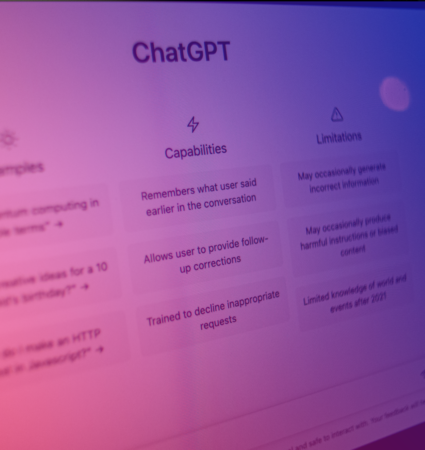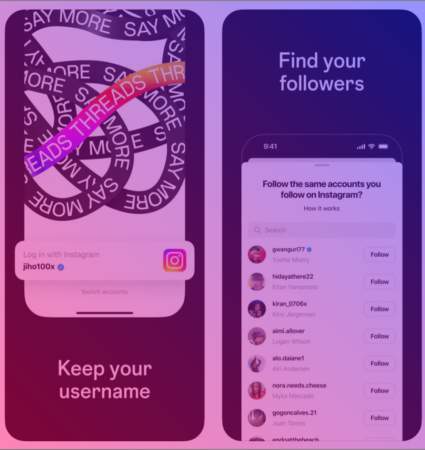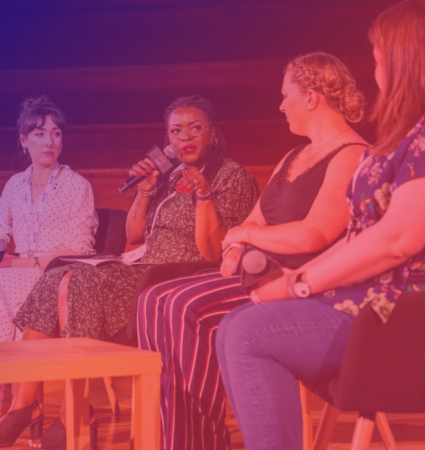Where should – and where shouldn’t – AI and ChatGPT play a role in your SEO strategy?
Talk of AI is everywhere, and no more so than in the world of search and digital marketing. Last week was the BrightonSEO conference and even there, you didn’t have to wait long to for someone to take the stage to discuss AI in one way, shape or form. And that includes our very own SEO Content Strategist, Ashley Liddell.
So, let’s try and cut through the noise. Just what role should AI content creation play in your SEO strategy, and when should you resist the temptation?
Why is everyone suddenly talking about AI?

Since its initial release back in November, the discourse around ChatGPT has only amplified as further iterations have been released, and it’s not difficult to see why. ChatGPT has been used as an example of how artificial intelligence can have huge benefits to organisations to produce content at scale, in a way that is incredibly accessible and affordable. That, quite naturally, is a huge temptation for many brands and marketers.
The search engines themselves have been betting big on AI technology (admittedly, to mixed results) and guidance from Google has suggested that, in the right time and place, it will be content for brands to deliver AI-generated content to users. These factors have naturally caused the SEO community to consider just what role – if any – AI plays in the way we go about doing things.
Understand the limits

The idea that AI could produce content at such scale sounds great, but is it really feasible for any brand looking to get towards the top of the search results in any sector, let alone those highly competitive and lucrative markets?
It wasn’t particularly difficult for any brand to find a way of procuring large quantities of content cheaply if they so wanted to. But few brands did so because all of the signs from the search results pages, the SEO community, and the search engines themselves, told us that wasn’t a viable approach – and the reason why that wasn‘t a viable approach is the same reason why outsourcing your content creation to ChatGPT isn’t a viable approach.
That’s because not only does ChatGPT, for all that its immensely impressive technology, tend to come up with limited, uninspiring, unentertaining, and often false content, but also because it goes against everything that Google has told us not only for many years, but also specifically in the past few months. Indeed, Google has specifically said that, whilst it believes AI has a place in the SERPs, that place is likely to be limited:
“If you see AI as an essential way to help you produce content that is helpful and original, it might be useful to consider. If you see AI as an inexpensive, easy way to game search engine rankings, then no.”
Those comments are very much reflective of the direction of travel Google has taken on even with the emergence of ChatGPT – particularly considering Google’s ‘EAT’ guidelines.
In December 2022, Google updated its search quality evaluator guidelines and the “Google EAT” guidelines that it introduced in 2018, adding an extra “E” to expertise, authority and trust – “experience”.
We’ve analysed the change in more detail previously but the fundamental point behind the change is that, as more and more brands produce more and more content, the bar for determining which content should rank needs to rise and experience, namely experience with the product or service, is seen as a way for Google to make that distinction. This is a standard that ChatGPT and AI can’t meet; ChatGPT can’t produce a review of a restaurant based on its experience of the food and service within it – it can only curate what has already been said by others.
For all that Google may be suggesting that AI-generated content has a place, that must be put into the context of its wider guidance; that in situations where audiences need to especially trust what they are seeing, we’re a long way from AI being able to compete with expertly crafted, original content.
What AI shouldn’t – and should – be doing for us

So all of this brings us to our key question – when should and when shouldn’t you be leaning on AI to help your SEO strategy? It all comes back to putting the limitations of AI into context with the guidelines and standards that Google has continued to push in the name of better search user experience.
So don’t, for example, believe that AI is going to be a viable option for delivering content without any form of human insight. Google is simply not going to allow the search results to become flooded with lots of brands, all pushing derivative content with no sense of brand positioning, individuality or lived experience of the subject matter. Your content and SEO teams are still going to be needed.
But what AI can do is help us. It can help us to make our content and SEO strategies more efficient, more scalable and perform better.
Using AI as a research tool.
Artificial intelligence has been a factor in many tool suites for some time – often those with expensive licences that may be out of reach of your SEO and marketing budget. But the democratisation of AI means that we can conduct top-level keyword research, pillar ideation and topic research much more quickly than having to wait for many of those third-party tool suites. Once AI suggests an opportunity, we can then pump it into our third-party tools to get ideas around search volumes, seasonality and potential traffic value – key pieces of insight that allow us to plan our strategies much more efficiently.
Using AI to get to the creativity sooner
AI isn’t there to be creative for us, but it can help us to get to the creative work much more quickly, helping us to support the content ideation process, discover related topics and come up with concepts that help the user experience more easily and effectively. A good example of this would be using AI to explore frequently asked questions or follow-up topics, and this insight can help us to steer our content ideation process in directions we may not have originally considered.
Make technical processes more efficient
Think of those laborious or repetitive technical tasks that are part and parcel of a good SEO strategy – and then think about how AI can support us in delivering on those tasks. We can use this technology to help us with all manner of tasks, including keyword clustering, mapping & intent analysis, meta descriptions, SEO titles & ALT tags, schema markup, Robots.txt, sitemaps, hreflang and so much more.
Again, this isn’t about relying blindly on AI, but about using it as an aid so that we can get to the higher-value, creative work much more quickly.
Improving experience by repurposing our content
With users changing how they search and the platforms that they search on, your content needs to be discoverable and consumable in multiple places.
Using AI, we can adapt and repurpose our content for those different formats, mediums and query types. If we wanted to turn multiple 500-word pages into more succinct pages to capture Google answerbox results, we can use AI to assist us in speeding that process up, for example.
AI can be an SEO’s best friend. It’s not an SEO’s replacement
The launch of ChatGPT, rather predictably, led to many different reactions, but perhaps the easiest to come across were either from fear amongst copywriters that they’re about to be replaced by machines, or hot-takes about (yet another) “death of SEO”. But those reactions bely what is actually going on here.
Yes, AI is here and it will get better but it will, for the foreseeable at least, likely remain a tool that is there to assist us, rather than replace us. That’s not the view of dismissive reaction of a luddite trying to keep his own job, but a view taken from an objective look at the direction of travel we’re seeing from search engines, from brands, and from AI itself.
What’s important for marketers is that they aren’t distracted by AI to such an extent that they make it the star of the show. Instead, it’s our backing singer.
Download Ashley’s presentation from BrightonSEO:





